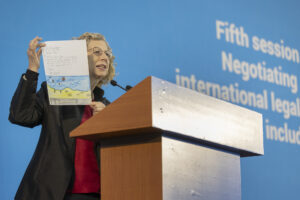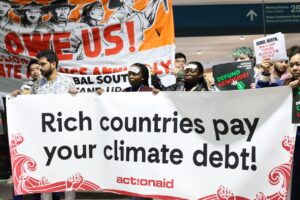
A new survey of 22,000 citizens in the world’s largest economies reveals overwhelming support for tax reforms and broader political and economic reform.
Over two-thirds (68%*) of respondents back a wealth tax, with only 11% opposed, while 70% support higher income taxes for high earners, and 69% favour increased corporation tax, according to the survey conducted by Ipsos.
Support for a wealth tax is highest in Indonesia (86%), Turkey (78%), the UK (77%), and India (74%).
Support is lowest in Saudi Arabia (54%), Argentina (54%), and Denmark (55%), but still over half the populations surveyed.
In the United States, France, and Germany, around two in three people support a wealth tax (67%, 67%, and 68%, respectively).
The survey, commissioned by Earth4All and the Global Commons Alliance, explored support for economic and political transformation across G20 nations.
Results also show that 71% of G20 citizens believe the world has a decade to act to protect the planet.
This belief rises to 91% of Mexicans, 86% of Kenyans, 83% of South Africans, and 81% of Brazilians.
This belief is lowest—but still over half the population – in Saudi Arabia (52%), Japan (53%), the United States (62%), and Italy (62%).
Broad support for green energy, nature, health initiatives
The findings come as finance ministers from G20 countries, including the United States, China, and India, prepare to meet in Brazil this July.
For the first time, a wealth tax is on the agenda as these nations deliberate on strategies to address economic and environmental challenges.
The survey highlighted broad support for using additional tax revenues to fund policies that protect nature, reduce inequality, and promote healthy living.
Key areas with strong backing include green energy initiatives, universal healthcare, and strengthening workers’ rights.
Even less popular policies, such as universal basic income and investment in citizens’ assemblies to strengthen democracy, attract support from about half of respondents.
Move beyond growth to measure economic success
Across the G20, most people believe economies must move beyond a singular focus on economic growth. 68% of those surveyed agree that the economy should prioritise the health and wellbeing of people and nature rather than focusing solely on profit and increasing wealth.
Furthermore, 62% believe that a country’s economic success should be measured by the health and wellbeing of its citizens, not just economic growth.
Trust in government low; demand for political, economic reform high
Trust in government remains low, with only 39% of G20 citizens believing their government can be trusted to make decisions for the benefit of the majority in the short term and just 37% trusting their government to make long-term decisions for future generations. This lack of trust is particularly pronounced in Europe.
There is a notable demand for reform of national and global political and economic systems.
In the G20, 65% of respondents believe their national political system needs major changes. A similar number (68%) feel the same about their economic system.
Optimism
The survey also asked whether people are optimistic about their future.
On average, 62% of G20 citizens are optimistic about their own future. However, only 44% feel positive about their country’s future, while 38% are optimistic about the future of the world.
People in emerging economies like India and Mexico are the most optimistic, while European citizens, for example, in France, Sweden, and the UK, are significantly less hopeful.
Owen Gaffney, co-lead of the Earth4All initiative:
“People want political and economic reform. They feel their economy is not working for them, which is why some are turning to populist political parties. Despite this, the vast majority of people still believe urgent action is needed this decade to tackle the planetary emergency.”
“Our survey results provide a clear mandate from G20 citizens: redistribute wealth. Greater equality will build stronger democracies to drive a fair transformation for a stable planet.”
Jane Madgwick, Executive Director at the Global Commons Alliance:
“Science demands a giant leap to address the planetary crisis, and the public agrees. 71% of G20 citizens support immediate, comprehensive measures this decade.”
Sandrine Dixson Declève, executive chair of Earth4All and co-president of the Club of Rome:
“This survey proves once again that citizens across G20 countries believe it is time for an economy that delivers greater wellbeing, more climate solutions, and less inequality. But the results also show a growing lack of trust in government, especially in Europe. With the recent European elections moving towards the radical right due to growing social tension, we need to hold governments accountable to introduce an economy that services people and the planet at the same time.”








